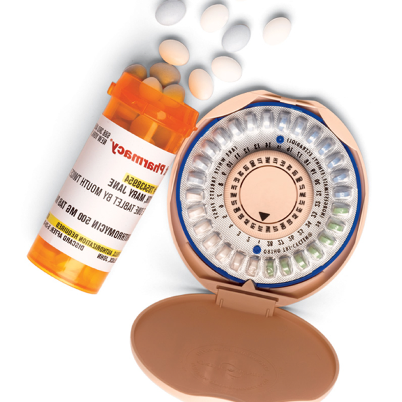
There is a widespread belief that antibiotics reduce the effectiveness of hormonal contraception, but research has found no evidence to support this claim. There is no indication of drug interactions between hormonal contraceptives and antibiotics, except in the case of Rifamycin.1
Rifamycin: The Antibiotic Proven to Reduce Oral Contraceptive Effectiveness
Rifamycin (other brand names include Rifampicin, Rifampin, Rimactane, Rifadin, Rifamate) is an antibiotic medication used to treat tuberculosis and travelers’ diarrhea caused by certain bacteria. It works by stopping the growth of the bacteria that causes lung infection and diarrhea.2 Rifamycin and other rifampin antibiotics induce hepatic enzymes that metabolize, or break down, hormones found in hormonal contraception, such as estrogen and progestin . Due to interactions such as this, it is critical that your health care provider is aware of all medications you are taking, including hormonal contraception (birth control pills, patches, rings, implants, injections).
Research on this subject is limited, but the studies that exist suggest that non-rifamycin antibiotics do not have an effect on hormonal contraception.3

Drugs and Supplements Proven to Affect Hormonal Contraceptives
All prescription medications come with safety information that warns of certain drugs interactions that can be dangerous or compromise the effectiveness of the medication. Although no known antibiotics, aside from Rifamycin, influence the effectiveness of hormonal contraceptives, certain drugs and supplements have the capability to do so.4 Drugs or supplements that are known to affect the mechanisms of hormonal birth control include the following:
- Anti-fungal drugs: griseofulvin and nystatin
- Anti-seizure and migraine drugs: phenobarbital, carbamazepine (also used to treat bipolar disorder, ADHD, and schizophrenia),and Topamax
- Herbal supplements: St. John’s Wort
As always, it is best to consult with your physician before taking a new medication and discuss potential drug interactions.

Concluding Remarks
Based on the research available today, rifamycin is the only antibiotic known to have a direct effect on the mechanisms of hormonal contraception. Due the lack of evidence produced so far, experts recommend more research be done to completely rule out the possibility that antibiotics affect birth control. Studies on this topic have not been sizeable enough to produce conclusive results, simply because not many females have become pregnant while using hormonal birth control and antibiotics at the same time.5 Concerned patients should talk to their doctors about new medications, and take all medications exactly as directed. If an individual is worried about the risk of pregnancy, using a non-hormonal back up form of contraception (like a male or female condom, or diaphragm ) can further reduce the risk of pregnancy.
References
- Allen, Rebecca, “Do Antibiotics Reduce Hormonal Contraceptive Effectiveness?”. Internal Medicine Alert, 2Oct. 2017.
- “Rifamycin: MedlinePlus Drug Information.” MedlinePlus, U.S. National Library of Medicine, 15 Jan. 2019.
- Kaunitz, Andrew MD “Do Antibiotics Reduce Efficacy of Hormonal Contraception?” NEJM Journal Watch: Summaries of and Commentary on Original Medical and Scientific Articles from Key Medical Journals, 22 Feb. 2018.
- “Using Medications With Birth Control: CU Women’s Health.” GYN, 2019.
- Simmons, KB, et al. “OBGYN.” Obstetrics and Gynecology, John Wiley & Sons, Ltd, 15 Dec. 2017.
Last Updated: 5 March 2020.
